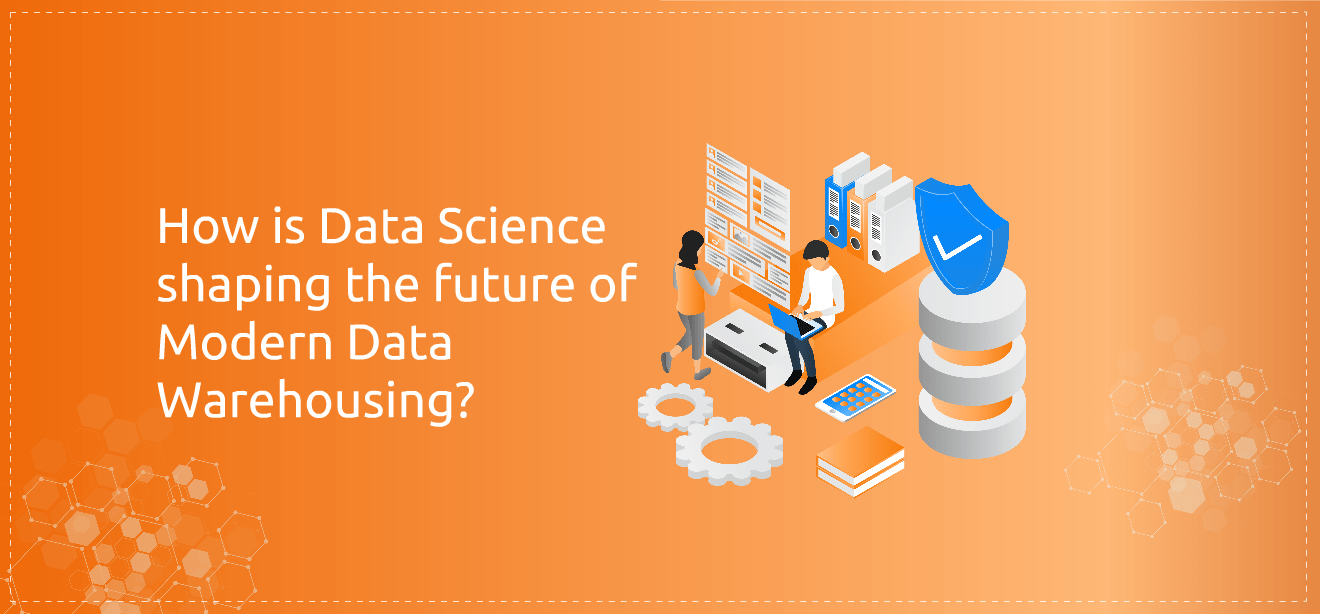
How is Data Science Shaping the Future of Modern Data Warehousing?
With evolving technologies and the growing complexity of business requirements, data has become more critical than ever. Data forms the backbone for all business decisions. In the years to come, data science will become a core factor in empowering business users and offering them greater autonomy in work by unleashing the power of modern data warehouses.
What is Data Science?
Data Science, encompassing multiple fields such as statistics, numerical methods, and data analysis, is the practice of putting together data through various stages, including cleansing, aggregating, and manipulating the data to conduct advanced analyses. Data scientists work on huge volumes of data and perform calculations.
In essence, data scientists and data analysts perform thorough analyses and draw meaningful, actionable insights from data gathered from numerous sources, including smartphones, employees, customers, and more.
Data science offers valuable trends and patterns on various business aspects based on the data analyzed, helping organizations achieve tangible outcomes. Leading companies leveraging data science include Amazon, Facebook, NetFlix, and Starbucks, to name a few.
What is Modern Data Warehousing?
Data warehousing is the realm of developing and creating data warehouses. In simple language, a data warehouse is created by integrating data from multiple, disparate sources, enabling reporting techniques, fetching valuable inputs through queries, analyses, and decision making.
Data warehousing deals with several operations such as data extraction, data cleaning, data transformation, data loading, and data refreshing. Of these, data cleaning and data transformation work towards addressing the quality issues of the business data to enhance value creation.
Despite moving into the digital transformation era, some organizations still continue to hold on to the traditional, on-premise, legacy databases that suffer from several lacunae. On the flip side, modern data warehouse refers to the cloud-based data warehouse architecture that is comparatively novel, wherein the data warehouses are accessed through the cloud. These offer a bunch of benefits, as compared to the on-premise, legacy data warehouses.

While traditional data warehouses work well and integrate only structured data formats, cloud-based modern warehouses possess the awesome capability to gel well with diverse big data formats.
Modern cloud-based data warehouses complete their tasks faster than on-premise data warehouses, thereby enhancing efficiency and productivity.
Traditional data warehouse software incurs consistent, ongoing costs on maintenance, upgrades, and patches. On the flip side, modern data warehouses, being cloud-native, operate on a pay-as-you-use model.
Modern cloud-based warehouses offer greater scalability, supporting huge datasets, which is quite difficult in the other scenarios.
In addition, there are a plethora of robust cloud-based data warehouse services available. Some of these that Decision Minds recommends include AWS Redshift, Google BigQuery, Microsoft Azure SQL, and Snowflake.

How does Data Science shape the future of modern data warehousing?
Data Science, Artificial intelligence (AI), and Machine Learning (ML) are no longer buzzwords. That said, data science is not merely restricted to statistics alone; it includes a broader spectrum of components applied in the data processing. AI is based on building models that create machines working like humans and in turn reducing the manual effort spent on various tasks. However, Data Science and AI are closely related. Data scientists use AI models to analyze and interpret various forms of data. On the same note, ML is a subset of AI and works on the huge volumes of data gathered from data science to train and test the models. As ML trains the models of data supplied by data science, there is no identity of ML in the absence of the field of data science.
Data warehouses will play a crucial role in emerging technologies, including Artificial intelligence and Machine learning. Modern data warehousing rests on the foundation of the cloud, which offers tremendous storage and computing power. On the other hand, machine learning involves working with complex algorithms, analyzing vast amounts of data, and identifying trends or patterns from historical data. The benefits offered by cloud platforms coupled with the advanced capabilities of ML could revolutionize modern data warehousing.
As modern data warehouses are cloud-native, they work at excellent speeds and drive high efficiency. The ML algorithms would perform faster at such high speeds, helping business users draw actionable insights on the organizational data. Thus, enterprises enjoy the advantage of deriving outcomes faster, with enhanced business value creation.
ML, which can resolve complex data problems with its array of algorithms, with cloud power in the modern data warehousing, will result in more accurate inferences being drawn, which are certainly a value add to the enterprise revenues.
In addition, data lakes which are unprocessed, unstructured volumes of raw data, and data warehouses, which on the contrary, are structured and processed, filtered data would be treated alike. In other words, by unlocking the surplus potential of machine learning combined with the powerful cloud platforms, modern data warehouses would handle and streamline the data lakes in no time, structuring them similar to the data warehouses.
In a nutshell, AI and ML, which are all closely linked to data science, would completely transform the model of modern data warehousing, unleashing the power they hold and rendering them as efficient and productive as never before. DecisionHUB, the innovative product from Decision Minds, offers various AI + ML services, being applied in conjunction with data science.
Closing thoughts
Data science, which encompasses AI and ML, offers a plethora of opportunities for modern data warehouses. These cloud-native data warehouses enjoy the superb benefits of limitless storage and near-infinite computing power. In addition, data science components and the advantages offered by the cloud could take businesses adapting to modern data warehousing to newer strides.
Recommended Articles

Importance of Data Analytics in Organizational Processes
Data analytics has taken the world by storm in the last few years. The field of data analytics is becoming the backbone of numerous industries such as advertising, manufacturing, automobile, healthcare, and pretty much every other sector.
Read More

How Business Analytics can enhance Customer Targeting?
Business analytics is a powerful tool used in various facets of marketing. These include forecasting trends, understanding customer behavior, calculating the likeliness/probability of an event to occur, knowing where your customer comes from, etc.
Read More

How should organizations start Data Modernization?
Data modernizations help eliminate the complexities, inadequacies, and inefficiencies revolving around the traditional legacy systems. Besides, modern cloud analytics software offers high-end features including - faster data migration, scalability, optimized storage, good governance, and real-time analytics.
Read More
Contact Us
Decision Minds
Leaders in Cloud Analytics, Multi-Cloud deployments, Business Intelligence and Digital Engineering.
Interested in doing a project with us? We would love to hear from you.
Enquiries: sales@decisionminds.com
Careers: career@decisionminds.com
2150 N First St, Suite 446,
San Jose, CA 95131
Phone: (408) 475-7873,
(408) 215-2031
Fax: (408) 709-1830, sales@decisionminds.com
1205 BMC Drive, Ste.122,
Cedar Park, TX 78613
Unit No G03, Ground Floor,
C2 Block, Brigade Tech Gardens,
Brookfield, Bengaluru,
Karnataka - 560037

